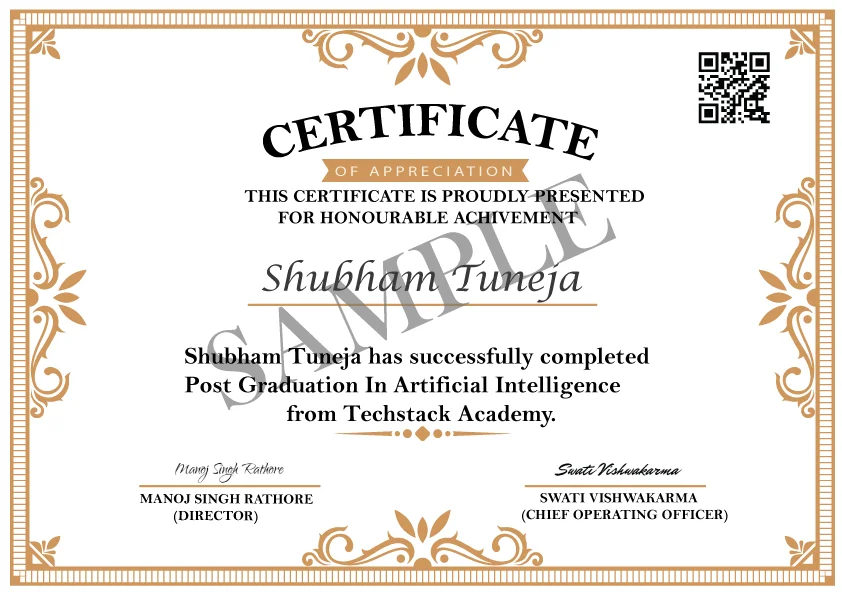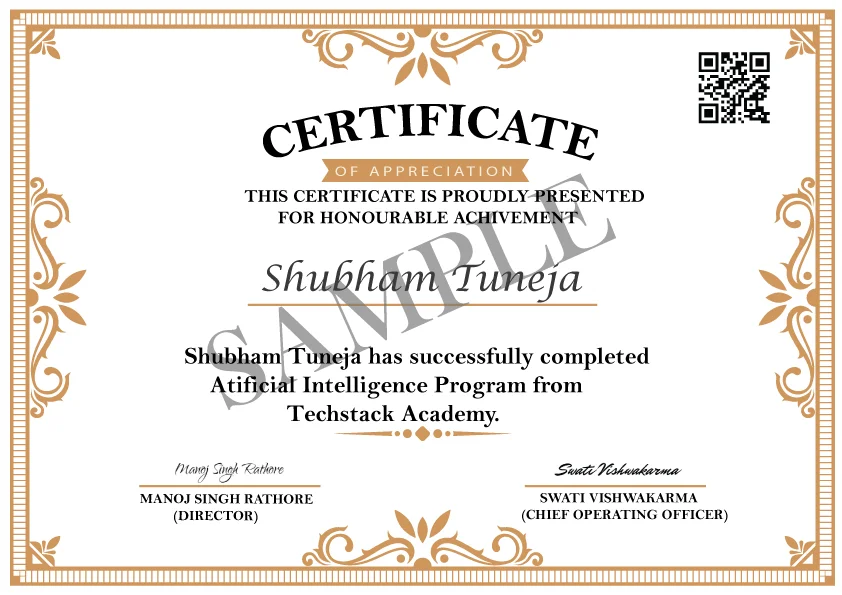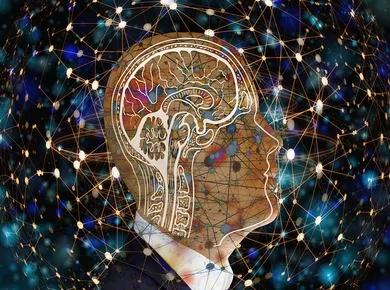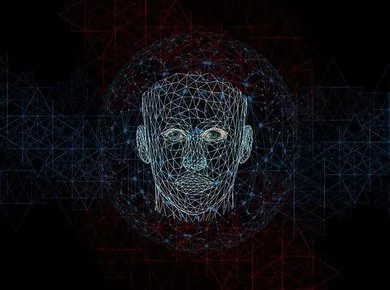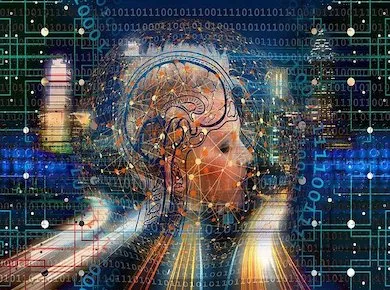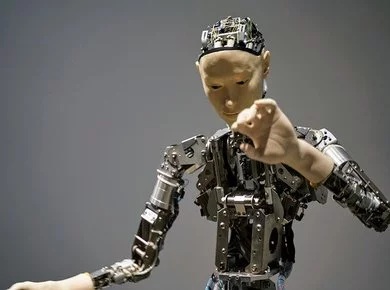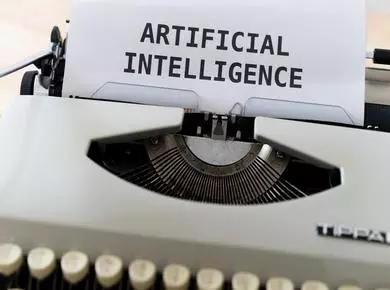23 Modules. 3 Live Projects.
Dual Credentials
Techstack Academy & Orangus
Affiliation
Orangus India & Startup India
4 Months
Recommended 10-12 hrs/week
29 Apr 2024
Program Start Date
EMI options
Starting at Rs. 11,000
India’s #1 Artificial Intelligence Course in Delhi in Associated Partner with:
















Curriculum
At Techstack, we believe in providing a full-fledged artificial intelligence course in delhi of your desire where our industry experts have designed a top-notch curriculum just for you.
- AI Course Structure ( 17 Modules )
Introduction to Python
- 3 Quizzes
- 1 Project
- An introductory remark about python.
- A brief history of python
- How python is different from other languages
- Python versions
- Installing python
- IDLE
- How to execute a python program
- Writing your first program
- Different types of languages used with Python
- Analyzing the strategies which are curated
Since the demand for Artificial Intelligence is at its peak, still it is essential to learn about the advancements of the language. We, at Techstack, have curated the curriculum carefully that comprises two courses where we get our hands laid on introduction with Python, its history, the versions, installing, and execution. There are many programming languages we will be teaching you which can be used in AI and ML implementations, amongst which one of the most popular ones in Python. Choose our Artificial Intelligence course in Delhi that sets the foundation so that we sail through the rest of our student’s journey with minimal hindrance, helping them achieve the utmost knowledge about the best Artificial Intelligence Course and its operation.
Python Basics
- 3 Quizzes
- 1 Project
- Basics to Python
- Python keywords and identifiers
- List, tuples, dictionaries
- Python statements
- Comments in Python
- Command-line arguments
- Getting use input
- Exercise
- AI capstone projects
- Arithmetic operators
Join Techstack Academy to attain the best artificial intelligence training in delhi to foster your skills in the field of AI in real world. We ensure to take your career growth into our hands by providing exclusive hackathons and masterclasses at our institute. Throughout this exclusive Artificial Intelligence certification training, you'll be able to master the concepts of Data Science with Python, Machine Learning, Deep Learning, & live sessions, practical labs, & projects held at Techstack. Once you join our Artificial intelligence course in Delhi, you will be 100% satisfied with the training and the subject taught in-depth by our certified trainers who hold great hands on experience up to 8+ years in this particular field.
Introduction to Machine Learning
- 3 Quizzes
- 1 Project
- Introduction To Machine Learning
- What is Machine Learning?
- History of Machine Learning
- How artificial intelligence relates to machine learning
- Data Science vs Machine Learning
- Fundamentals of Machine Learning
- Tools and techniques to know how machine learning works
- Different types of machine learning
- How to prepare the data
- Analyzing the data prepared
Explore the introductory and the core concepts of machine learning by joining our Artificial Intelligence institute. Techstack Academy is listed amongst the top 10 Artificial Intelligence institutes in delhi. Artificial Intelligence is an exciting branch that offers a variety of sub-topics inclusive of introductory to machine learning, different types of machine learning, differentiating between data science and machine learning, and at last, analyzing the data prepared that will provide the skills you need to become an expert that will unlock the power of this emerging field. Our curriculum for artificial intelligence course in Delhi, which is designed in guidance with industry and academia to develop job-ready skills for your future.
Machine Learning Concepts
- 3 Quizzes
- 1 Project
- Branches of Machine Learning
- Different phases of Machine learning
- Modeling
- Data preparation for modeling
- Train test split
- Evaluation of the model
- Classification of ML
- Data Mining
- Overfitting the ML Error
- Concept clearance of decision tree
Once you choose our online or offline artificial intelligence course in delhi, you will be liable to have a complete understanding of how Machine learning moves ahead. The term machine learning is often considered as a farming or gardening, which contains the seeds that are known as algorithms, nutrients are the data, the gardener is you and plants are the programs, and we at Techstack are reapers who are responsible to groom you well in the particular field of AI, under the sub-topic of machine learning. We have compiled some ideas and basic concepts of Machine Learning that are helpful for the students to understand in-depth the subject as well as for beginners who have just landed in this exciting world.
Supervised Learning
- 3 Quizzes
- 1 Project
- Classification of supervised learning
- KNN
- Logistic regression
- Naive Bayes
- Decision Tree
- Linear Regression
- SVR, KNN Ridge Regression
- Model complexity
- Generalization performance
- Connection b/w model complexity & generalization performance
- Importance of feature scaling
- Cross-validation for model evaluation
Get ready to take your tech skills to the next level with Tecstack Academy! Our experts are bound to deliver you with the best of knowledge in whichever course you may choose. Supervised learning makes it possible for you to search for patterns in historical data in relation to all fields and in accordance with a special field, called “the target field”. The artificial intelligence training syllabus at Techstack is extravagant and designed exclusively, allowing you to have deep knowledge about supervised learning, with the classifications, Decision tree making, differentiating b/w model complexity, and generalization performance, cross-validation for model evaluation, and many more. Upskill your skills with Techstack’s Artificial intelligence course in Delhi.
Advanced Supervised Machine Learning Concepts
- 3 Quizzes
- 1 Project
- Ensemble Learning
- Learning critical problem of data
- Leakage check-in machine learning
- Detecting problems and ways to rectify it
- Using techniques of Lagrange multipliers for constrained optimization problems
- Latent variable models
- Regression and classification
- Performance of algorithms
- Tools and techniques to be used
- Analyzing the data accumulated
We have a group of leading practitioners who bring current best practices and variables to provide you with sessions that fit into your work schedule easily and efficiently. Get thorough research with theoretical and practical knowledge about advanced supervised machine learning concepts ranging to start from providing you with an overview of ensemble learning, critical problems of data, usage of different languages, the performance of algorithms along various tools and techniques to be used for better performance. Our artificial intelligence course in Delhi, also introduces theoretical machine learning, including mathematical models of machine learning, with the out-of-the-box design and rigorous analysis of learning algorithms.
Unsupervised Learning
- 3 Quizzes
- 1 Project
- What is unsupervised learning?
- Introduction to the algorithms of unsupervised learning
- Types of unsupervised learning
- K-means clustering
- Various kinds of learning
- Recommendation Engines
- Association
- Supervised vs. Unsupervised Machine Learning
- Applications of unsupervised machine learning
- Disadvantages of Unsupervised Learning
To search for the best Artificial Intelligence Course in Delhi, you have landed at the most appropriate platform, wherein at Techstack, we provide our students with an opportunity to implement the skills they have learned so far, and then finally turning them into the pro of AI. The wide availability of experts and dedicated mentoring sessions held at our institute will enable you to know how to solve a real industry-aligned problem. We also assist you with real-time hands-on projects which might be considered in the final step for your learning path. Our motive is to keep our students updated with the most precedent knowledge about unsupervised working and algorithms that showcase your expertise to other people, in the same field for your future.
Natural Language Processing
- 3 Quizzes
- 1 Project
- Introduction to NLP
- NLP ad NLTK
- Ways how natural processing works
- NLTK extension and exploration
- Tools and techniques used in NLP
- Breaking down the elemental pieces of language
- Brief history and case study
- Sense of textual data
- Use cases of NLP
- Topic modeling
At Techstack Academy, the artificial intelligence course syllabus is curated in a manner to deliver the utmost knowledge to our students covering all the major topics that may include different ways to process natural language, tools and techniques, sense of textual data, use cases of NLP, topic modeling and so on. The professionals here come from extremely diverse and techy backgrounds who have worked for years and are certified corporate professionals implementing real-time artificial intelligence training projects. Join the Artificial intelligence Institute in Delhi and give a boost to your existing skills. Our strong associations with plenty of top organizations make us capable to help place our students at one of the most renowned MNCs around the globe.
Sentiment Analyzer
- 3 Quizzes
- 1 Project
- Description to sentiment analyzer
- Preprocessing- tokenization/tokens to vectors
- Sentiment analysis using logistic regression
- Sentiment lexicons
- Regular expressions
- Sentiment Analysis Tool
- Twitter sentiment analysis
- Advantages of using sentiment analysis
- Different types of Deep Learning techniques
- Keeping a check on the analyzer
We, at Techstack, are dedicated to taking every course and subject in action with deep understanding to deliver our students with immense knowledge to help them transform into an expert. Attain one of the best artificial intelligence Course in Delhi and unveil your super skills by elevating them with Techstack Academy. Upon the completion of your AI course, you will also receive certificates from us our artificial intelligence institute in Delhi. These certificates will testify to your skills as an expert in Artificial Intelligence Program. Our sub-topic of sentiment analysis is diversified to provide you with knowledgeable skills, our trainers are staunch to let you grow within your preferred field.
Latent Sentiment Analysis
- 3 Quizzes
- 1 Project
- Introduction to Latent Sentiment Analysis
- PCA and SUD
- LSA in Python
- Advanced LSA
- Theory and practical of LSA
- Classification
- Implementing LSA in Python using Gensim
- Pros and cons of LSA
- Use cases of Topic Modeling
- Determination of the optimum number of topics in a document
Discover the undiscovered topics with our Artificial Intelligence Institute in Delhi, wherein we are dedicated to offering you courses that match your preferences. It is essential to have thorough knowledge about latent sentiment analysis if you are willing to go for artificial intelligence. To become an expert in this field you will be required to extract ‘knowledge’ from a large amount of collected data. We are a renowned artificial intelligence institute in Delhi, who provides top artificial intelligence courses in Delhi with relevant information and content available for retrieval and recommendations. We also provide you with an immense amount of tools and techniques that are beneficial for you to analyze and understand the data.
Article Spinning
- 3 Quizzes
- 1 Project
- Introduction to article spinning
- Article rewriter
- N-gram model
- Natural language generation vs article spinning
- Republishing in a different format
- Implementation of article spinning with Python
- Pros and cons associated with article spinner
- How article spinner has given an edge to AI
- Different ways to use the tool
- Extra features of article spinner
Content spinning is all about using a robot which is done by using software which is the greatest part of Artificial Intelligence Traiining. Natural language generation uses deep learning which enables the creation of human-like readable text which results in a unique article based on a language prediction model. We provide the best certification for an artificial intelligence course in Delhi that includes all kinds of tools and techniques to take an original article and produce one or more variations by replacing specific words, phrases, or sentences with alternate versions. Choose from the top 10 artificial intelligence institutes in Delhi and widen your horizon. This arena of AI helps students learn about a variety of pros and cons associated with article spinner. The Implementation of article spinning with Python is also an essential topic to understand, our professionals are right here to treat you with an in-depth understanding of the entire concept of article spinning at our artificial intelligence institute in Delhi.
Tensorflow and Neural Network
- 3 Quizzes
- 1 Project
- Introduction to Tensorflow
- Computation Graph Tensors
- How is a neural network implemented in TensorFlow?
- Placeholder and variables
- TensorFlow basics
- Conceptual understanding of Neural Networks
- Core API components
- Model evaluation
- Deep learning with Tensorflow
- Learning Tensorflow with Python
If you are willing to gain knowledge about TensorFlow, you must acknowledge that it is an open-source library for machine learning applications. Join Techstack the artificial intelligence institute in delhi and get thorough information in regard to Tensorflow, its components, the core APIs, model evaluation, deep learning with neural networks, etc. Our Academy is dedicated to acquainting you with extremities of knowledge about Tensors. The Deep Learning course with TensorFlow certification training is developed at Techstack which is taught by industry leaders and aligned with the latest best practices. Maximize the area of your expertise with an unlimited pool of practice sessions and questionnaires held regularly. You can also elevate your skills with our artificial intelligence institute in Delhi, by attaining better knowledge by learning Tensorflow with Python and other programming languages.
Convolutional Neural Network
- 3 Quizzes
- 1 Project
- Introduction to conventional neural network
- Types of layers
- Activation layer
- Pooling
- Flattening
- Fully connected layer
- Softmax, argmax and cross entropy
- Perceptron
- Activation function
- Cost function
- Tools and techniques used
- Gradient descent backpropagation
Get more details about the conventional neural network which is a deep learning algorithm that has a tendency to put an image and assign importance to various networks to be able to differentiate from others. We are regarded amongst the top 10 artificial intelligence institutes in Delhi. We make sure, to help students know every bit regarding the specialized domains, Techstack Academy has a team of experts from the industry that assure you to provide you with ultimate knowledge and skill about the working of neural networking. We also train you truly to reach your goals in the field of variant types of layers, activation functioning, Softmax, argmax, and cross-entropy as well as gradient descent backpropagation. Once you finish the artificial intelligence course, you will be able to use your new skills in artificial intelligence training and placement by our team, helping you land your dream job.
Website Artificial Neural Networks
- 3 Quizzes
- 1 Project
- Introduction to artificial neural networks
- Linear and logistic regression with Tensorflow
- MNIST case study through CNN Tensorflow
- LSTM networks
- Mimicking the process through various algorithms
- Restricted Boltzmann machines
- Autoencoders
- What are the disadvantages of artificial neural networks?
- Practical applications of ANN
- Predictive modeling
An artificial neural network is known as the component of artificial intelligence that is meant to simulate the functioning of a human intelligence. If you are keen to learn more about the artificial intelligence course in Delhi, join our Academy now. We, at Techstack, open doors to thousands of opportunities, to teach and inspire students to think for their betterment. AI is not an easy subject to learn within a few months, but our professionals at Techstack make it happen. We believe, nowadays, holding just a professional degree is not sufficient. Therefore, to assist you today as well as your future, we provide you with the best of resources to learn and understand new emerging technologies that will help you to acquire the necessary skills and knowledge to keep you ahead in your career of artificial intelligence training in Delhi.
Object Detection
- 3 Quizzes
- 1 Project
- Object Detection overview
- Overview of R-CNN
- Concept of fast R-CNN
- Classification of the objects
- Understanding faster RCNN
- Use cases and applications
- Image recognition and segmentation
- Working of object detection on the edge
- Choosing appropriate tools
- Implementing mask RCNN in Python
Object detection is inextricably linked to many computer vision techniques similar to image recognition and image segmentation which helps you to understand and analyze scenes in images or video. Join our artificial intelligence course in delhi and know-how the different ways of object detection with us. Get to know all about artificial intelligence training in Delhi and know the ways how we bridge the gap between the basic CNN architecture that you are already aware of and modern architectures like Resnet. Our teaching methods are faster and move forward with state-of-the-art to help you implement various segmented masks of RCNN in Python. Learn the modern ways with deep learning in regard to object detection only with Techstack Academy Artificial Intelligence Institute in Delhi.
Face Detection
- 3 Quizzes
- 1 Project
- Introduction to face and eye detection
- Viola jones algorithm
- Haar-like feature
- Integral image
- Training classifiers
- Adaptive boosting
- Cascading
- Merging faces
- Yawn detector and counter
- Facial recognition
The face detector is one of the most popular techniques that has been followed for a long time. An exquisite software that works in a manner to solve reasonably well by classical feature-based techniques, such as the cascade classifier. We are recognized as the best artificial intelligence institute in delhi as we not only focus on one formula to help our students understand face detection but also focus on other arrays namely merging faces, yawn detection, training classifiers, adaptive boost, and many more such terms. If you want to broaden your employment options or advance in your chosen career, join Techstack Academy, as we offer deep learning methods that have achieved state-of-the-art results on the standard benchmark, specifically for face detection datasets.
Motion Analysis and Object Tracking
- 3 Quizzes
- 1 Project
- Introduction to motion analysis
- Motion detection and pose estimation
- Filtering by color
- Background subtraction and foreground subtraction
- Using mean-shift and Camshaft for object tracking
- Single-object localization
- Object segmentation and tracking
- Ways to object/person detection
- Analyzing the object
- Optical flow
To learn a complete artificial intelligence course, you must choose an appropriate artificial intelligence institute that offers you the right education by professionals having great years of hands on experience in the same field. Join Techstack Academy, listed amongst the top 10 Artificial Intelligence institutes in delhi, that are dedicated enough to deliver exquisitely crafted curriculums that would suit your requirements perfectly. Learn more about Motion analysis, an array that is performed on a day-to-day basis without giving it much thought. Every year millions of students are released into the market and only a few get to seek their dream job. Joining our artificial intelligence training in Delhi will assure you of 100% job placement post the completion of your course.
- Capstone Project
- Career Assistance: Resume building, Mock interviews, 1:1 mentorship and Career fair
- Program Certificate from Orangus India and Techstack Academy
Capstone Projects
Live Projects of Artificial Intelligence Course from the Partner Agency ( Orangus & Team Variance ).

5000+Projects Completed
500+Domains
3M+Keywords
Next Word Prediction
automatically predict the next word you want to type.
Automatic Attendance
automating attendance system using a camera.
Music Recommendation
recommending new music to users based on their interests
Email Spam Classifier
Classifying spam email based on the content of the email alone
Handwritten Digits Recognition
A system that can identify the digit written via hand by people.
Movie Recommendation
A system that recommend movies based on the user's saved history.
T - rex Dino Bot Algorithm
algorithm for the bot that will learn itself by making mistakes.
Frauds Detection System
To predict whether the customer will make a fraud or not.
Join India's #1 Artificial Intelligence Course in Delhi
Faculty and Mentors
With years of experience, our faculty members are here to deliver you a high-quality learning experience both online and offline, whilst providing wings to your tech skills!
20+Professors
1300+Industry Mentors
2+Award winning faculties
Our Faculty



Career Support
Our well-connected job placement team is dedicated to providing you with the best opportunities from the top organizations that are relevant to your profile.
350+Leading organizations hire our alumni
7000+Successful career transitions
Reviews by Students
Know what our students have to say about us.

Akash SharmaArtificial Intelligence
I've never indulged in learning a course like this before (Remotely), but with Techstack Academy, it was possible. The trainers were so down to earth, and always had friendly behaviour and proven ready to help me with my doubts whenever required.

Nakshatra MehtaArtificial Intelligence
The best part of learning @Techstack Academy is they provide 3 months of internship which is inclusive in the course of artificial intelligence itself. I had an amazing experience during the course, along with getting an opportunity to learn and diversify my arena of skills in the period of those months of internship.

Shruti KaushikArtificial Intelligence
I went for counseling and was not satisfied enough but later I was recommended to attend a demo session which proved to be of great help. The trainer seemed highly experienced and gave an overview of the artificial intelligence course very humbly. This is where I was convinced, henceforth the entire journey at Techstack was valuable. Glad to join here, now I am working as a junior AI expert!! Could not be any happier!

Shivangi MehtaArtificial Intelligence
Got through AI, and it is worth mentioning the head of the institute, Mr.Manoj Singh Rathore, a truly friendly and humble personality who helped me get through the course easily. Prashant Sir, the trainer had great years of experience and tackled all my doubts effectively. Techstack Academy did not just help me with theoretical knowledge in terms of AI but was also given to lay hands on real world and real-time projects that helped me to learn and analyze myself more. This is by far the best artificial intelligence institute in Delhi, I have come across!

Aryan MalhotraArtificial Intelligence
Truly grateful for getting such comprehensive information from Techstack Academy. Teachers here are really humble and dedicated enough to provide you with the entire course syllabus. The best time I learned here was while working on the projects given, they were of extreme benefit and helped me diversified my knowledge better. Get utmost training in artificial intelligence institute in Delhi, only at Techstack Academy.

Akshita AroraArtificial Intelligence
I was very pleased with the experience at Techstack Academy by having a new prospect in the course of AI. The teachers have been very communicative on progress and the administration was also actively involved to help me, whenever I faced any sort of issue. If you are too looking forward to a technical platform to upscale your skills, then you must choose an AI course in Delhi at Techstack Academy.
Batch Starting: 29 Apr 2024
#1 Artificial Intelligence Course in Delhi
Program Duration: 4 Months
Program Certification from


100% Classroom Training
Upskill with Techstack Academy
25+ Case Studies
Become Applied AI Scientists, Applied AI engineers, AI architects, Technology architects, Solution Engineers, Technology Consultants,Data Scientist.
Get 130+ hours of intensive learning in AI over 4 months.
Create portfolio-worthy projects
Start Your Own Startup
Why to Join Artificial Intelligence Course
Learn about our Artificial Intelligence Course in Delhi
Learn how to build, curate and deploy industry-related projects given by us, to become a certified Artificial Intelligence Expert. This course must be a career transition aspect for you, following the step-by-step guide for your excellence, enhancement of the skills, and making you a complete AI Professional. The practices are combined with deep learning, machine learning, and data science practices. Enroll yourself today and become an expert under professional guidance.
Payment Method
We have variety of payment methods in Techstack Academy.






Application Process
Fill the application form
Fill the application form to help us understand about you and all your necessary details before you move further to join Techstack.
Counselling Process
Take a word with our counsellor and know-how about the different subjects running at Techstack! Our cooperative process is held to give you the necessary information required.
Join Program
Fasten your seat belts to become an industry-expert by joining one of our courses.Get yourself acquainted with the best of the knowledge provided by Techstack Academy!
Upcoming Application Deadline
Have you filled up our forms yet? If not, then buckle-up before the batches get full! We are waiting to hear from you, and take your career onto the next level, with us!
Deadline: 29 Apr 2024
FAQ's on Artificial Intelligence Course in Delhi
Which is the best artificial intelligence institute in Delhi?
With the wide availability of artificial intelligence institutes in Delhi, it can be really daunting to choose the best amongst all. For your feasible search and easy access, it is advisable to choose and learn at Techstack Academy. They offer quality educational training along with covering theory as well as practical sectors. You will not just attend regular classes but will also be given certain projects to work on, which is why they are regarded as one of the best artificial intelligence institutes in Delhi.
How can one get placements after pursuing an artificial intelligence course in Delhi?
Once you join Tecstack Academy you will not only be introduced to underlying new conceptual ideas rather you will also be assisted with various internship programs. The best highlight to joining Techstack is, they have an exceptional placement cell that offers 100% guaranteed placement assistance.
What is the fee structure of the artificial intelligence course?
To become a certified artificial intelligence professional, you have to submit a minimal and affordable fee. Techstack believes in providing quality education with a reasonable amount, ranging from Rs.35k/- to Rs.1,50,000/-
Why Should I Join Your Artificial Intelligence Course?
In order to prepare yourself for a future-proof career in the field of Artificial Intelligence, then you will be required to take an extravagant artificial intelligence course which is seen as a fundamentally new approach to every problem and situation. We, at Techstack, are right here to help you with all your queries and problems in regard to AI. We believe in grooming every individual in and out if they are seeking any course at our institute. Once you make a venture into the AI field, you will be likely to dive into an arena that holds multiple options to choose from. Join the best artificial intelligence course in Delhi and boost your career in artificial intelligence can be realized in a variety of settings such as public organizations, private corporations, scientific research, government agencies, data science, and the military. Joining our institute will make you ready to get into the new opportunities of the world.
What Is The Minimum Duration of an Artificial Intelligence Course in Delhi at Techstack?
The artificial intelligence course in Delhi at Techstack is designed in an exclusive curriculum that represents not only theoretical knowledge but also practical knowledge to train you with. The minimum duration of AI Course in Delhi is about 3 months wherein you will be knowing all the basics of AI, the way it works, the algorithm, tools, and techniques used, etc. Later you can also expand your knowledge by increasing the course duration up to either 6 months or up to 12 months or more, based on your preference.
How Many Students Are Present In One Batch?
Since we are very dedicated to providing our students with the utmost knowledge, we intend to keep our batches short. We, at Techstack, believe that having small batches makes it easier for the students as well as the trainers to teach and understand better. There are approximately 8-10 students in one batch which ensures better clarity and understanding to the students for their courses. We take care of your time, money, and efforts to join Techstack Academy, to maintain that trust for you, we keep a regular check on your performance and hold appropriate assessments and assignments to see your progress, which is why we are regarded as the best artificial intelligence institute in Delhi.
Can We Pay The Fee of Artificial Intelligence Program in Installments?
The fees can easily be paid in installments, which is applicable only for the course that is above the duration of 3 months. Maximum 2–3 installments in one year is available and before you make the final call, it is recommended for you to take the permission from the HOD first. Stay stress-free when it comes to the payment as we make it easier for you to pay, by allowing the option of paying in installments, at Techstack Academy! Join the best artificial intelligence institute in Delhi and ease your way.
Do The Teachers Present At Techstack Hold Great Experience?
Trainers/Teachers/Experts at Techstack Academy are extremely professional and hold their expertise in the field for more than 8 years. They are so staunch and dedicated to their teaching, that they do not just focus on the entire batch rather take up the responsibility of every individual. To us teaching is not the end of our duty, it is the end when you are fully understood and equipped with the knowledge of that teaching. This is the reason why Techstack Academy is listed amongst the top 10 Artificial Intelligence institutes in Delhi. With their years of hands on experience, long hours of study, and holding plenty of semi/webinars, they are more groomed than ever before, in terms of teaching.
I am From a Non-Technical Background. Can I Still Apply for an Artificial Intelligence Course?
Irrespective of the fact, if you are a techie (belonging to technical background) or not, you are still eligible to join our artificial intelligence course in Delhi. The only prerequisite required for you to step into the venture of AI involves basic computer skills and a sharp mind to easily catch things. Artificial Intelligence Program is not an easy subject to learn, for which it requires being fully dedicated to the topics you are studying. There are various topics present that will teach you how machine learning works even if you have no prior knowledge of programming and college-level mathematics.
Do You Provide Any Webinars or Seminars?
Yes, Techstack Academy does provide regular webinars and seminars for your better understanding. This way, we believe, is the way to help students and teachers to reach their way out and interact with each other, whether individually or in groups. Trainers are readily available to assist you with all your doubts and rectify them according to your preference. If that route sounds attractive to you, then by all means follow our webinars/seminars held regularly, often exclusive to the course content that you choose.
Do you provide online session for artificial intelligence program?
Since the entire world is running digitally, from shopping to ordering foods at any time of the day, then what is the problem with studying digitally? We have broken this taboo a long back and ever since then are actively involved to provide our students with online sessions. The training at Techstack Academy is convenient for you to enroll in offline as well as online classes. We provide you with a free demo/trial session before you join us! The prices of the fee may differ from each other.
Do You Provide Job Placement and Security Assistance?
YES! Techstack Academy-recognized as the top artificial intelligence institute in delhi has tie-ups with the most refined and well-renowned MNCs that enable you to get 100% job placement. Once you are done with your course, you'll be having an internship program with us which is included in the 6 months of the course. The internship may last for 45 days, with proper certification for the same. After all, this is done, we guarantee you to get placed at the best company in whichever you are willing to seek knowledge and grow your career into.
I am still studying in School But Have a Great Interest To Learn About AI, Can I Join an artificial intelligence institute in delhi?
No matter if you are currently studying in school, college, or are aged. Learning has no age. Therefore, we follow the same mantra at Techstack too. There is no minimum age requirement to join any course at Techstack. If there is the will in you to learn everything in-depth then nothing shall be able to drop you. After school choosing an Artificial Intelligence Institute in Delhi is by far the best option you may choose. Young brains have an innate capability to easily diversify and enhance their field of choice with our best artificial intelligence training in Delhi.
Our Learners Work At
Know where our students get placed.






Know More About Techstack
What’s the most popular programming language used in Artificial Intelligence Training?
Of course, we hear you when you ask which is the most popular programming language used in AI, the answer to this question comes directly to the point as we all know Python is the most used programming language of all time. Our Artificial Intelligence course in Delhi focuses on providing the students full-fledged about the course. AI programming languages and what they are suitable with not just one but plenty of languages namely, C ++, Java, Lisp, Prolog, Python, and R are the main AI programming languages that are developed and designed for different kinds of software. There is no best language for AI; every language is great wherever it fits best.
What are AI neural networks in Artificial Intelligence Course?
ANN, broadly known as Artificial Neural Networks is generally referred to as the computing system which enables the system to stimulate in a manner the way a human brain analyzes and processes information. ANN is said to be an extremely advanced network as it has innate, self-learning capabilities which enable them to produce great results as the data tends to become widely available. Joining an Artificial Intelligence course in Delhi, at Techstack will surely assure you to hype up and upskill your knowledge. Artificial neural networks have been applied in all areas of operations.
What’s the difference between AI and ML?
Artificial intelligence and machine learning are correlated with each other. These two technologies are the most trending technologies which are usually used to create intelligent systems. The Artificial intelligence system does not require to be pre-programmed rather it runs on a network that uses such a variety of algorithms that can work with its own intelligence. This involves machine learning algorithms namely, reinforcement learning algorithms and deep learning neural networks. On the other hand, machine learning enables the computer system to make certain predictions using a massive amount of structure or sometimes unstructured data.
What’s a Turing test?
Turing test is a simple method in terms of AI, which determines if a computer is capable of thinking like a human intelligence or not. With such amazing and fast pacing technology, rapid advances in computing are now visible in many aspects of our lives. There are various programs that hold a tendency to translate one language to another within a blink of an eye. Our Best Artificial Intelligence institute in Delhi will let you know the ways to let robots clean an entire home within a few minutes. The finance robots can also create personalized retirement portfolios and wearable devices that track our health and fitness levels. Talking about the updated version of the Turing Test, this contains a lot more than one human judge interrogating and chatting with dual subjects.
What’s a random forest and its role in Artificial Intelligence?
Random forest is a unique algorithm that is used for a variety of tasks inclusive of classification and regression. Choose the best artificial intelligence institute in delhi and learn more about the different kinds of algorithms that are used. Before you proceed further with this robust technology model, it is necessary for you to also have knowledge about how decision trees are built. A decision tree is a simple way of classifying real world examples and testing the data sets machines, easily.
What are the typical characteristics of elements in a list and a dictionary?
Lists are referred to as arrays that are declared in varied languages. Although the lists in AI courses require to be homogenous which makes a greater impact as the most powerful tool in Python. A single list that is already present might contain different data types, namely- Strings, Integers, as well as objects. Lists are said to be mutable, as they have a tendency to be altered even after their creation. Compared to dictionaries, on the other hand, the dictionary which is present seems to be unordered with the collection of data values. It has the capacity used to store data values like a map, unlike the other Data Types this holds only a single value as an element, Dictionary contains key: value pairs. This is also separated by a colon :, whereas each key is separated by a ‘comma’.
How are computer vision and AI-related?
It is easier to solve this issue, as computer vision tends to obtain relevant information from images or multi-dimensional images. After the amalgamation of both, these as finding tasks that require human intelligence to derive some pattern out of it. The task can be automated, once you work on developing a computer vision application. This assures the way how vision and AI work together and mimics the way humans visualize and identify objects. This is an advanced type of technology called"computer vision," which enables computers to read and identify visual images.
Where to generally source your data sets?
There are plenty of areas available to source the data sets when it comes to Artificial Intelligence courses. It is surely strenuous to choose the ideal and specific dataset using a variety of NLP techniques. The preference of the dataset solely depends on the level of competence you are working with. Data Sets available for different sources namely computer vision sets, NLP, COCO Datasets, etc. To distribute the work involved in the collection of data and preparing, inclusive of image recognition, data normalization, and algorithm training for machine learning, among other tasks.
What are the different domains of Artificial Intelligence?
Artificial Intelligence is a broad term that does not limit to just one section but is widespread to different domains. The AI that works on phones is way different than the one used on your desktop or PC. Wherein, to implement the right AI, there are majorly 5 domains which are most commonly used, namely- video games or board games, where the most AI systems are developed to play games and be worthy opponents to human players. AI systems already exist in the cars, autonomous in assistance to the driver. It can also be used in logistics, design and architecture, transportation systems, and many more!
What is deep learning in term of artificial intelligence?
Deep learning is known as a subset of machine learning in terms of artificial intelligence. This contains an exclusive network that has a unique capability to know-how about unsupervised learning from data that is unlabeled and unstructured. Deep learning intends to mimic the working of the human brain in its processing thereby detecting objects, ways to recognize speech, translation of languages whilst making decisions. Deep learning has evolved drastically hand-in-hand, majorly in all forms in and around the world. The wealth of information is increasingly adapting to AI systems to gain automated support.
Why choose us?
As we know, your future and careers depends on us, we make sure to deliver a holistic view of the entire syllabus that we provide, helping you attain in-depth knowledge.
Full-Fledged Curriculum
At Techstack, we deliver an amalgamation of courses beyond your field of expertise to help your career reach greater heights.
Step-By-Step Learning
We create a roadmap for your journey, starting from novice to becoming an expert.
Lifetime Support
Your journey at Techstack doesn’t end with the completion of the course, you will gain the status of Techstack Alumni for a lifetime.
Browse Related Blogs
To help inspire you about the latest information, we have pulled together with the most creative, clever and effective information from around the blogosphere!
Contact Us
If you are keen to learn about a variety of courses that can provide you with an ultimatum of knowledge, choose Techstack! We have a International reputation for excellence due to the outstanding quality of our teaching and support, resulting in positive outcomes for your future.
More About Techstack
June 2019 Batch
NAYANIKA BANERJEE :It is very important to give your students the right to speak and have a voice of value. Therefore, Techstack Academy is the ultimate platform, that taught its students by covering all the minute details. I joined the 3-month course of Data Science, the duration seemed short but the classes offered an intensive curriculum which was designed in an exclusive manner that I was able to learn many things just in 3 months. The best part about Techstack is, they also take up practical knowledge as equal to having theoretical knowledge.
ASHWIN MEHRA :During the lockdown period, the whole world was affected badly. In those terms, we were not allowed to move out of our houses, that is when I had the need and interest to join a new course to enhance my knowledge. I searched well and landed on the Techstack website, and was almost convinced just by looking and hearing the reviews about them. I had everything online, from my counselling to my demo session, till the course, and it has never been this easy to learn something ever before. I think it was all possible due to Techstack Academy and the faculty members who are experienced enough to let students soar high in their chosen field of specifications.
RICHA OBEROI :I was very hesitant to join the course at first, but sooner I discovered I can broaden my skills more by joining Techstack as they also provide their students with internship programs that are already included in the course. The internship was proven of utmost help to me as I was able to learn not just one but mastered every sector of data science. I was also provided with an internship hands on experience letter, which helped me get through a great job. Thanking Techstack would not be enough, learning here has changed my life and have put a great emphasis to my knowledge and career prospects.
AAYUSHI TRIVEDI :When the goals are explicit and the progress is rewarded, everyone is prone to perform better. At Techstack Academy, it was super easy to learn things ex[ecially a challenging course like Data Science. I belonged from a non-technical background but still was able to grab the best of information all with the help of great trainers available. They assisted me well throughout the course, and used to recognise and motivate me a lot, due to which I am, what I am today! Thank you, Team Techstack for defining my future well! Now, I can proudly call myself a data science analyst, as I have tested all my knowledge practically as well as theoretically, and have passed all the assignments with good grades!








